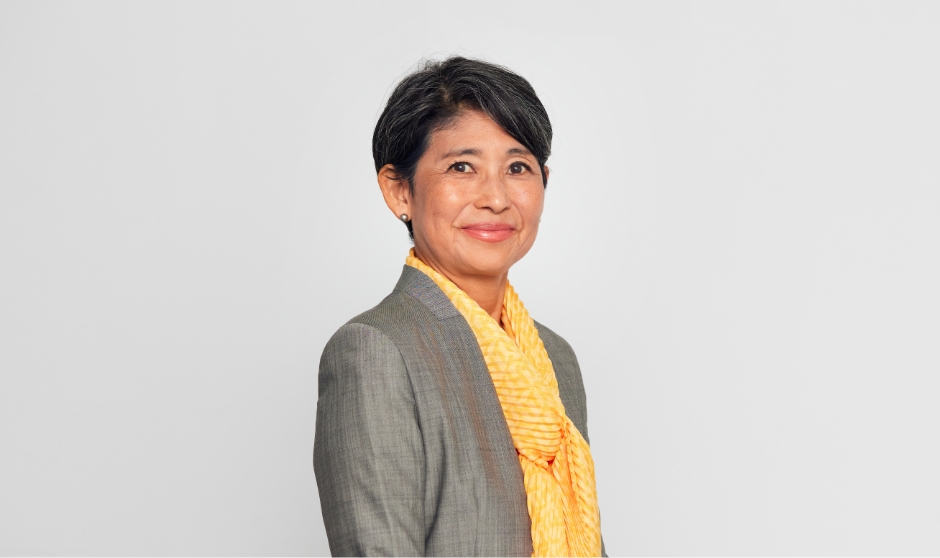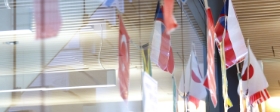ProfessorIRIE, Kay

Where do you want to be and what do you want to be doing in 10 years? The program of International Social Sciences offers you opportunities and challenges that will help you develop your imagination, skills, and confidence necessary to sharpen your future self-image and become that. Come and join the program to challenge yourself in the community where teachers and students share their diverse experiences and inspire each other.
Courses
- Self-directed Learning Ⅰ
- Self-directed Learning Ⅱ
- Economics in the World
- Advertising and the Media
- CLIL Seminar: Language, Business, and Society I
- CLIL Seminar: Language, Business, and Society II
- Independent Studies
CLIL seminars are CLIL (Content and Language Integrated Learning) classes taught by ISS’s English faculty members. Therefore, the course aims to develop the students’ language skills. The focus of CLIL Seminar: Language, Business, and Society I focuses on the relationship between language and society primarily through formal language education, which often reflects the country’s language policy and how people perceive the value of foreign and second languages. The topics are based on the research (data) related to language use and education in Japan and the world. CLIL Seminar: Language, Business, and Society II focuses on the relationship between language and business through some market research data and literature on language learning-related businesses, mainly in Japan. In both classes, I encourage my students to read the materials critically, form their opinions, and discuss them in class. I hope the students will find the courses challenging linguistically and academically but also eye-opening and stimulating.
Profile
| 2016 | Professor, the Faculty of International Social Sciences, Gakushuin University |
| 2014 | Professor/Preparatory Office for the Faculty of International Social Sciences, Gakushuin University |
| 2011 | Associate Professor/Foreign Language Center, Tokai University |
| 2011 | Adjunct Professor/Temple University Japan College of Education Graduate School |
| 2005 | Ed.D. in Curriculum, Instruction and Technology in Education, Temple University |
| 2004 | Lecturer/Cornerstone Education Center, J.F. Oberlin University |
| 1997 | M.Ed. in Curriculum, Instruction and Technology in Education, Temple University |
| 1990 | Hon. B.A. in Anthropology, University of Western Ontario |
Fields of Specialization
Applied LinguisticsTESOLLanguage Learning PsychologyResearch MethodologyResearch content
The area of my expertise can be broadly defined as Teaching English to Speakers of Other Languages (TESOL), but my research focuses on Language Learning Psychology, with an emphasis on motivation. While there is no significant difference in the level and speed of achievement in one's native language (first language), the level and speed of achievement in a second language differ greatly from person to person depending on cognitive, psychological, and social factors. By deepening our understanding of these differences, I hope to contribute to the development of English language education and the promotion of English language learning.
Major Publications
- Irie, K. (2022). Rethinking the role of classroom communication: learning from older learners, Innovation in Language Learning and Teaching, 16:2, 107-117, DOI: 10.1080/17501229.2021.1884252
- Irie, K. (2022). Self-efficacy. In T. Gregersen & S. Mercer (Eds.), The Routledge Handbook of the Psychology of Language Learning and Teaching (pp. 100-111). Routledge. https://doi.org/10.4324/9780429321498-11
- Irie, K. (2019). An insider’s view: launching a university program. In H. Reinders, S. Ryan, & S. Nakamura (Eds.), Innovation in Language Teaching and Learning: The Case of Japan (pp. 211-232). Palgrave Mcmillan.
- Irie, K., Ryan, S., & Mercer, S. (2018). Using Q methodology to investigate pre-service EFL teachers’ mindsets about teaching competences. Studies in Second Language Learning and Teaching, 8(3), 575-598. https://doi.org/10.14746/ssllt.2018.8.3.3
- Irie, K., & Ryan, S. (2015). Study abroad and the dynamics of change in learner L2 self-concept. In Z. Dörnyei, P. MacIntyre, & A. Henry (eds.), Motivational Dynamics in Language Learning, (pp. 343-367). Multilingual Matters.
- Irie, K., (2014). Q methodology for post-social-turn research in SLA.Studies in Second Language Learning and Teaching, 4 (1), 13-32.
- Irie, K., & Brewster, D. (2013). One Curriculum, three Stories: Ideal L2 self and L2-Self-Discrepancy profiles. In M. Apple, D. da Silva, & T. Fellner (Eds.), Foreign Language Motivation in Japan (Chapter 8, 110-128). Bristol: Multilingual Matters.
- Irie, K., & Stewart, A.(Eds.).(2012). Realizing Autonomy: Practice and Reflection in Language Education Contexts. Basingstoke: Palgrave Macmillan.
Contact

Office : South 2-307

 Japanese
Japanese

 Contact Us
Contact Us